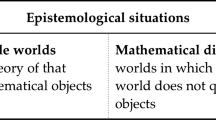Abstract
One of the most influential arguments for realism about mathematical objects is the indispensability argument. Simply put, this is the argument that insofar as we are committed to the existence of the physical objects existentially quantified over in our best scientific theories, we are also committed to the mathematical objects existentially quantified over in these theories. Following the Quine–Putnam formulation of the indispensability argument, some proponents of the indispensability argument have made the mistake of taking confirmational holism to be an essential premise of the argument. In this paper, I consider the reasons philosophers have taken confirmational holism to be essential to the argument and argue that, contrary to the traditional view, confirmational holism is dispensable.
Similar content being viewed by others
References
Azzouni J. (1998). On “on what there is”. Pacific Philosophical Quarterly 79:1–18
Azzouni J. (2004). Deflating existential consequence. Oxford University Press, New York
Balaguer M. (1998). Platonism and anti-platonism in mathematics. Oxford University Press, New York
Benacerraf P. (1973). Mathematical truth. In: Benacerraf P., Putnam H. (eds) The philosophy of mathematics. Cambridge University Press, New York, pp. 403–420
Colyvan M. (2001). The indispensability of mathematics. Oxford University Press, New York
Chihara C. (2004). A structural account of mathematics. Clarendon Press, Oxford
Field H. (1980). Science without numbers. Princeton University Press, Princeton, New Jersey
Frege G. (1970). In P. Geach, & M. Black (Eds.), Translations from the philosophical writings of Gottlob Frege. Cambridge: Blackwell
Gödel K. (1947). ‘What is Cantor’s continuum problem?’. In: Benacerraf P., Putnam H. (eds) The philosophy of mathematics. Cambridge University Press, New York, pp. 470–485
Hawthorne J. (1996). Mathematical instrumentalism meets the conjunction objection. Journal of Philosophical Logic 25:363–397
Katz J. (1998). Realistic rationalism. The MIT Press, Massachusetts
Maddy P. (1992). Indispensability and practice. The Journal of Philosophy 89:275–289
Maddy P. (1997). Naturalism in mathematics. Clarendon Press, Oxford
Maxwell, G. (1962). The ontological status of theoretical entities. In Minnesota studies in the philosophy of science (vol. III, pp. 3–27). Minnesota: University of Minnesota Press.
Putnam H. (1962). What theories are not. In: Nagel E., Suppes P., Tarski A. (eds) Logic, methodology, and philosophy of science. Stanford University Press
Putnam H. (1971). Philosophy of logic. Harper & Row Publishers, New York
Quine W.V. (1948). On what there is. Review of Metaphysics 2:21–38
Resnik M. (1995). Scientific vs. mathematical realism: the indispensability argument. Philosophia Mathematica 3:166–174
Resnik M. (1997). Mathematics as a science of patterns. Clarendon Press, Oxford
Sober E. (1993) Mathematics and indispensability. The Philosophical Review 102:35–57
Van Fraassen B. (1980). The scientific image. Oxford University Press, New York
Vineberg S. (1996). Confirmation and the indispensability of mathematics to science. Philosophy of Science 63(Supplement):256–263
Author information
Authors and Affiliations
Corresponding author
Rights and permissions
About this article
Cite this article
Dieveney, P.S. Dispensability in the Indispensability Argument. Synthese 157, 105–128 (2007). https://doi.org/10.1007/s11229-006-9035-y
Received:
Accepted:
Published:
Issue Date:
DOI: https://doi.org/10.1007/s11229-006-9035-y



